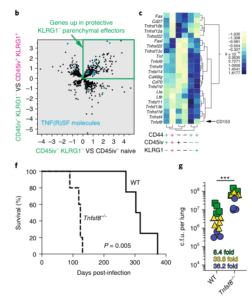CD4 T cells, particularly those that express IFN-γ have been shown to be essential for control of Mycobacterium tuberculosis (M.tb) infection in both animal models and humans. However, numerous studies have shown that IFN-γ expression by CD4 T cells is not the sole mediator of host protection.
Previous studies have shown that lung-resident KLRG1- CD4 T cells compared to non-lung resident KLRG1+ CD4 T cells confer superior protection demonstrated by reduced bacterial growth upon M.tb challenge. However, research has not been extensively conducted to determine what other functional features beyond Th1 cytokine, PD-1, CXCR3 and CX3CR1 co-expression are associated with the “protective” KLRG1- CD4 T cell phenotype. Thus, Sallin et al., aimed to determine molecules that are associated with the “host-protective [in mice]” KLRG1- CD4 T cell phenotype.
Sallin et al., demonstrated that the Tnfsf8 (CD153) knock out mice were highly susceptible to M.tb infection demonstrated by higher lung bacterial burden and reduced survival compared to wild type mice. Adoptive transfer of both IFN-γ-/- and Tnfsf8-/- CD4 T cells to T cell deficient mice resulted in similar survival against M.tb infection compared with wild type. Suggesting that in addition to IFN-γ, CD153 is also required to control M.tb infection. Researchers also showed that CD153 expression by M.tb-specific CD4 T cells in in rhesus macaques is associated with low bacterial burden per granuloma, and is enriched in lung resident CD4 T cells compared with PBMC. Similarly, in humans CD153 expression by functional (Th1 cytokine+) CD4 T cells is lower in active TB patients compared with healthy M.tb-sensitized individuals.
In summary, using samples from mice, rhesus macaques and humans , Sallin et al., demonstrated that CD153 plays a role in mediating host control of pulmonary M.tb infection. Thus, warranting further studies that determine CD153s mechanism of action.
Journal Article: Sallin et al,. 2018. Host resistance to pulmonary Mycobacterium tuberculosis infection requires CD153 expression. Nat. Microbiology
Article by Cheleka AM Mpande











